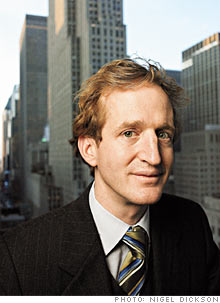Gasp! Fund manager commits selfless act
A big, respected mutual fund management company voluntarily cuts fees. Who'da thunk it?
 |
| Chris Davis, head of Davis Advisors |
(Fortune magazine) -- It's fun writing about Wall Street's greedheads and tax dodgers. But every once in a while, I get to write about something positive -- and unpublicized -- that some Wall Street types have done. Today's reversal of the Street's natural order involves Davis Advisors.
The firm, which runs the Davis New York Venture (NYVTX), Selected American Shares (SLASX), and Clipper (CFIMX) mutual funds, has voluntarily reduced management fees on those funds and six others. Not because of a problem, not because of competition, but because it wanted to do the right thing for investors.
I stumbled on the cuts, which took effect July 1, one night when I was reading a shareholder report from a Davis-run fund my family owns. I'd hoped that reading the report would help me fall asleep, but instead I came awake when I found the fee cut, buried in a footnote. (I got the full fee-cut list when I asked Davis for it.)
Fund firms make their money from fees, which are calculated as a percentage of a fund's assets. To give you the short version, Davis reduced its fees -- which had started at 0.65% in Clipper and Selected American and 0.75% at Davis New York, and then scaled down -- to a top of 0.55%. That saves New York Venture, Selected American, and Clipper funds $750,000 a year each.
That isn't a staggering amount of money to investors in those three funds: 1/400 of 1% annually for New York Venture, 1/100 for Selected American, 7/100 for Clipper. But it's reasonably serious money for the Davises, who are voluntarily walking away from about $3.3 million a year in fee income.
Russ Kinnel, Morningstar's director of mutual fund research, says that giant firms like Fidelity, Schwab, and Putnam sometimes cut fees for competitive purposes. But it's very unusual, he says, for an already low-cost outfit like Davis to cut fees on the funds that are the core of its business.
So what's going on? Chris Davis, the third-generation head of the family-owned management firm, says it cut fees because it was the right thing to do. "If we were starting those funds today, we would start out charging 55 [hundredths of 1%]," he says. "There's no reason that investors in those funds should be prisoners of history."
The Davis funds have "breakpoints." That means that as funds grow bigger, each new dollar of assets pays a less-than-fund-average fee, while increasing Davis's total income. It's a virtuous cycle -- the more dollars Davis makes, the less investors pay as a percentage of their investment.
But when the funds got clobbered in the 2008 to early 2009 bear market, funds' assets fell below their breakpoints, so average fees rose at the same time that the value of investors' shares were being eviscerated. That bothered the Davises, who have more than $1 billion of their own money in their funds, and thus shared investors' pain. (And no, they're not cutting fees to save their own money -- they own only 4% or so of the affected funds.)
In addition, Chris Davis says, the managers felt they should give up some fees because fund investors were taking enormous hits, some of which he attributes to his faulty investment decisions.
This is the second time I've seen Davis lower fees. The first was in 2004, when it eliminated the 0.25% 12(b)(1) marketing fee for Selected fund investors who held $10,000 or more in the funds directly rather than through fund "supermarkets," like Schwab and Fidelity, that charge managers for shelf space.
That cut was prompted by Selected's feisty board of directors, which a decade earlier had hired Davis to replace the previous managers. But the recent cut was purely voluntary, says Jim McMonagle, Selected's chairman. "Chris just told us Davis was cutting fees," he says. "We didn't ask him to do that."
So there it is: Wall Street acting good. Next on the agenda: looking west to see the sun rise.
-
 The retail giant tops the Fortune 500 for the second year in a row. Who else made the list? More
The retail giant tops the Fortune 500 for the second year in a row. Who else made the list? More -
 This group of companies is all about social networking to connect with their customers. More
This group of companies is all about social networking to connect with their customers. More -
 The fight over the cholesterol medication is keeping a generic version from hitting the market. More
The fight over the cholesterol medication is keeping a generic version from hitting the market. More -
 Bin Laden may be dead, but the terrorist group he led doesn't need his money. More
Bin Laden may be dead, but the terrorist group he led doesn't need his money. More -
 U.S. real estate might be a mess, but in other parts of the world, home prices are jumping. More
U.S. real estate might be a mess, but in other parts of the world, home prices are jumping. More -
 Libya's output is a fraction of global production, but it's crucial to the nation's economy. More
Libya's output is a fraction of global production, but it's crucial to the nation's economy. More -
 Once rates start to rise, things could get ugly fast for our neighbors to the north. More
Once rates start to rise, things could get ugly fast for our neighbors to the north. More








